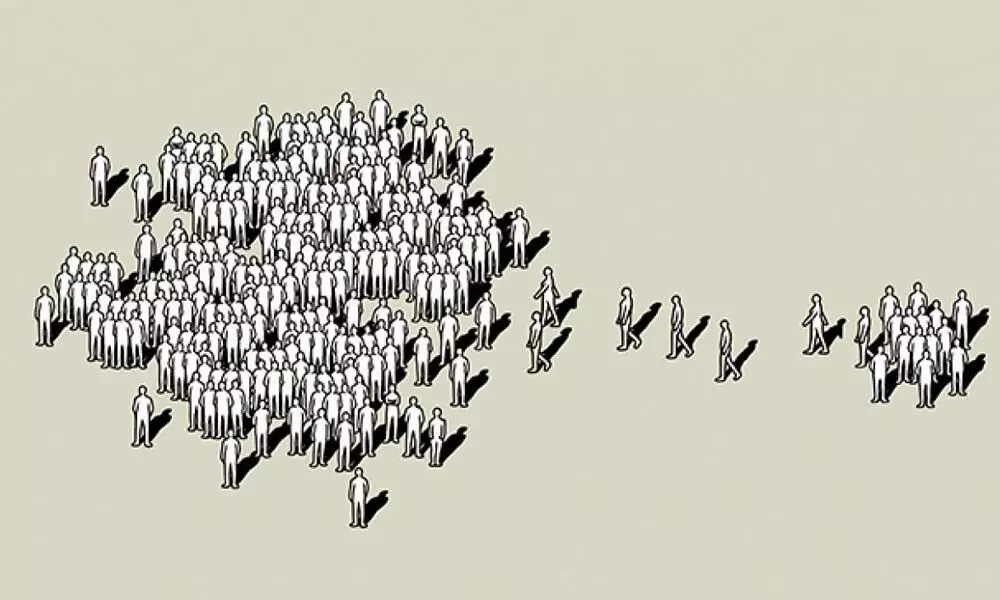Democracy, deflections and defections
Talking of paper, this game has been limited to newspaper headlines once upon a time two decades ago! But the advent of social media tools has given free-for-all platforms for all
image for illustrative purpose

Defections are nothing new to Indian politics. The Aaya Ram Gaya Ram culture has been ruling the roost for many years. The latest example that comes to one's mind is the infamous defection of NCP's Ajit Pawar to the BJP and quickly rebounding to his original party within 80 hours
CONGRESS candidates from across Goa visit Mahalaxmi Temple, Bambolim Cross and Hamza Shah Darga and took a pledge of loyalty towards the people of Goa and the party. So reads a tweet by the Congress.
Jittery? Well, Congress critics may say that, but the fact remains that the party wants to make sure that the last post-election drama is not re-enacted with the BJP playing last minute tricks or literally hijacking 15 of the 17 elected MLAs to form the saffron government. Goa, Karnataka, Uttarakhand and Manipur are some other examples of polit(r)icks. The Loyalty Pledge might at best serve as a moral binding on Congress candidates, but today's politics is all about anything-can-happen-at-any-time. Not certainly glorious – to borrow an expression by Sunil Gavaskar that cricket is a game of glorious uncertainties!
Defections are nothing new to Indian politics. The Aaya Ram Gaya Ram culture has been ruling the roost for many years. The latest example that comes to one's mind is the infamous defection of NCP's Ajit Pawar to the BJP and quickly rebounding to his original party within 80 hours. Late Indira Gandhi was instrumental in the formation of two governments at the Centre and pulling the carpet from under their feet. Many such memories come alive when one talks about election politics in the context of the polls to the legislative assemblies of five key States between February 7 and March 10.
Television serial scripts do change with their seasons. For instance, Hindi soap Bade Achhe Lagte Hain has a totally different treatment to its script as compared to the previous avatar. But unfortunately, there have been no changes, irrespective of the seasons, in the political blame games that dominate the campaigning for the elections.
Having observed the political rallies since 1977, I wonder as to why the political class of their campaign advisors have not been able to come out with something useful for the society other than tu-tu-main-main games and slogans. Elders have the responsibility of mentoring youngsters but this onus remains only on paper.
Talking of paper, this game has been limited to newspaper headlines once upon a time two decades ago! But the advent of social media tools has given free-for-all platforms for all. One does not have to wait for the next morning newspaper, one gets to read it almost instantaneously. This tsunami of messaging is causing a lot of communication pollution and that is certainly a matter for concern as it leaves the society confused.
Mobile telephony has certainly helped the nation to beat the illiteracy barrier with the smart phones helping with visual communication to reach out to the target audiences. Gone are the days when the campaign noise was limited to audio and then video cassettes. Small video clips are helping us to spread the communication. This certainly is a powerful medium. But, tragically, this power too is being misused predominantly for blame games.
What is even tragic is that the blame games begin much before the formal election campaigns are launched. Even while launching a development project, leaders often talk about what the previous governments have not done. The development plank gets deflected. One succeeds in planting hate messages in the minds of the people. Does this spring from the inferiority complex of the leaders or do they want to hypnotise the people with negative thoughts?
While media is free to report through its social media and mainline media tools, the analysts have an extended role to play. Does this deflection strategy arise out of a fear psychosis that the development project will not meet the aspirations of the people? Or whether the leaders try to opaque their failures with proactive allegations? We have cases of some tricky speakers indulging in distortions of history, apart from painting a thorny picture of their opponents.
Can some media veterans or political scientists present quick, brief analysis of certain political statements for the better understanding of the electorate? This analysis need not be limited to week-end intellectual columns or debates. Without getting swayed by the so-called popular waves, one can present quick views. I have seen some leading English publications presenting quick edits along with news reports. This can be extended to major announcements laced with blame games. It could be a worthwhile idea for non-English publications, too, to try this idea and keep their readers better informed rather than leaving them confused.
Charles Dudley Warner (not Mark Twain) once said, everybody complains about the weather, but nobody does anything about it. Everybody talks about the media being a responsible arm of democracy and we must do something about it!
(The author is a Mumbai-based media veteran now running websites and youtube channel known for his thought-provoking messaging)

